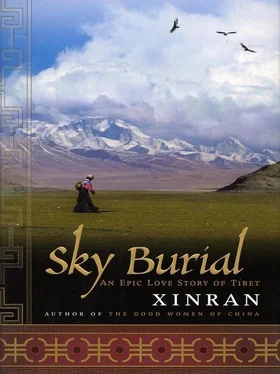Eventually she found a notice bearing the number 560809 held up by a soldier with a startlingly youthful face. She fished out from an inner pocket her now rather damp military papers and passed them to the hand attached to the face. The face smiled briefly and the hand beckoned. Two weeks of travel with the army had taught Shu Wen the body language of soldiers like this one. As she staggered in the wake of the childlike young man she considered how, as a student, she had never thought to wonder how China’s fifty-six groups and thousand regional accents managed to communicate when they got together. Now she realized the importance of gesture and the common language of human emotion.
Wen had imagined that once she reached Chengdu, she would be able to start making inquiries about Kejun right away, but when she joined Kejun’s former unit she discovered that only the number 560809 remained the same: the whole unit had been re-formed, from officers down to foot soldiers, and no one knew exactly where the previous unit had been fighting in Tibet, let alone about Kejun’s own particular section. A staff officer told her that, going by previous deployments, they might have been somewhere near the Bayan Har mountains in the unpopulated northeast region of Qinghai. However, information was scarce because there had been few survivors and those that there were had already been posted elsewhere. On the inside cover of her Collected Essays of Liang Shiqiu, Wen wrote down “Bayan Har mountains.” Perhaps she would be able to find more detailed information about Kejun on the way to this place-although her heart went cold at the thought that there were few survivors. “My Kejun is alive,” she recited to herself, over and over again.
There were two days of rest, reorganization, and instruction about going into Tibet. Wen and two other doctors were taught how to deal with some of the problems they would encounter, including altitude sickness. They were each given a portable oxygen tank and many spare cylinders. Goodness knows how I’m going to carry these around, thought Wen, if I begin to suffer from mountain sickness myself. Most of them had experienced a little altitude sickness already-a slight headache, a touch of breathlessness-but it was bound to get worse the farther they traveled into Tibet. The average altitude of “the roof of the world” was around 4,000 meters.
Finally Wen and her comrades-in-arms clambered into their army trucks and set off along the famous Sichuan-Tibet Highway. On their backs they carried their few possessions wrapped up in a quilt and bound onto a backpack with a cord. At night they would simply unroll their quilts and sleep on the ground.
The convoy was huge: several dozen trucks containing nearly a thousand men. Wen was overwhelmed by both the number of soldiers and the magnificence of the road. It was even more impressive than she had imagined. Endlessly twisting and turning, it took them through crowds of mountains. The weather was constantly evolving. One minute it was like a warm spring day with flowers in bloom, then suddenly white snow was flying around them. She felt as if she had entered a fairyland where a thousand years in the outside world passed in a single day.
Most of the soldiers on the trucks were young men of about twenty. They laughed noisily and punched each other as they discussed what little they knew of Tibet-the lamas, hermits, and nomads; the legendary cruelty of the people. Wen could tell that, beneath their bravado, they were nervous. They knew nothing of the conflict they were entering and rumors of the brutal physical punishments that Tibetans meted out to their enemies abounded. Wen realized that most of these young soldiers were uneducated peasants, utterly incapable of understanding such a diverse, remote people. She thought of Kejun’s dedication to his Tibetan studies, his determination to master the language. She squashed herself into a corner of the truck and meditated on her goal: to find Kejun. Her thoughts were like a cocoon and she barely noticed the chatter of the other soldiers, the intense discomfort of the journey, the freezing cold nights, the extraordinary landscape. She was roused from her reverie only when, after days of traveling along the highway, the convoy of vehicles left the road and began driving over grassland that seemed to stretch endlessly in all directions. Wen had no idea where they were headed. She didn’t even know if they were driving north or south. She wondered if they would be going anywhere near the Bayan Har mountains. She hadn’t been prepared for a landscape that lacked any kind of landmark around which to orient oneself. They hadn’t yet seen a single sign of human habitation.
The convoy was able to proceed only in stops and starts, and cases of altitude sickness began to increase. Some of the soldiers in the trucks cried out that their heads hurt, some couldn’t breathe properly, and some could hardly stand. As one of only three doctors in a convoy of more than a thousand soldiers, Wen had to rush back and forth with the portable oxygen tank on her back, teaching soldiers how to breathe, while feeding oxygen to those who were already semiconscious.
Just as people were beginning to acclimatize, Wen realized that something worse was happening. The convoy was slowing down and they could hear scattered gunfire in the distance. Sometimes they thought they saw human figures hiding behind rocks and thickets. They began to fear an ambush. Within a few days, the difficult terrain forced the convoy to split up and Wen’s truck was left in a group of only seven vehicles. Although the area they were traveling through had allegedly already been “liberated” by the Liberation Army, there was hardly a local to be seen, no military units, and no signals accessible to the radio operators. Anxiety began to eat away at the soldiers on board the trucks as the emptiness of the mountains, the thinness of the air, and the violent changes in the weather enfolded them in a world of fear.
During the daytime they derived some comfort from the extraordinary scenery and the living creatures they spotted along the way-the birds and animals. But at night, with the dramatic drop in temperature, the sounds of animals, and the moaning of the gales through the trees, Wen and her companions felt caught halfway between this world and the next. Nobody knew what was going to happen. They expected death to strike at any time. They huddled together around their campfires and tried desperately to sleep. Wen lay awake listening to the wind. She seemed to hear Kejun’s voice in the trees, warning her to be careful, not to get soaked by the dew or burned by the campfire, not to go off alone.
One morning, as the company woke at the light of dawn, the rigid corpses of two soldiers were discovered, gleaming Tibetan knives protruding from their breasts. The soldiers on sentry duty confirmed to each other in whispers that they hadn’t heard a single thing all night long. The knives must have been thrown with incredible precision.
The next day, and the day after that, exactly the same thing happened: no matter how many watchmen they stationed, or how many fires they lit, the weary soldiers were greeted at dawn by two corpses stabbed with Tibetan knives. There could be no further doubt: they were being hunted.
Nobody could understand why only two soldiers were being killed each time. Whoever was doing this had chosen not to attack the whole convoy but to play a more dangerous game. Because two of the dead were drivers and no one else knew how to drive, they were forced to abandon two of the trucks and crowd into the remaining vehicles. A deathly silence fell over the convoy. Wen knew that everyone was contemplating the sudden, violent fate that might become theirs.
Wen had no fear of death. She felt that she was drawing ever closer to Kejun. Sometimes she even hoped that she had entered the borderland between the living and the dead. If Kejun was already on the other side, she wanted to see him as soon as possible, no matter what manner of hellish underworld he was suffering in.
Читать дальше












